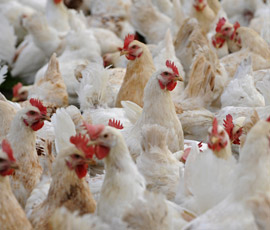Modern hens shun friendships, study shows

Hens reared in commercial conditions do not form friendships and are not particular about who they spend time with, a Royal Veterinary College study has found.
The research, published in the journal Applied Animal Behaviour Science, was carried out to discover if the welfare of chickens could be improved by taking advantage of friendships.
“We investigated the possibility that domesticated egg-laying hens form distinct ‘friendships’ by examining whether or not individual chickens were particular about who they spent most time with,” said research leader Siobhan Abeyesinghe.
“This is not so odd a question as you might think: in humans and other species, friendships have been shown to enrich life positively, buffer against stressful experiences and even improve reproductive success.”
The movements of eight identical groups of 15 laying hens were monitored over eight weeks, examining whether pairs of birds were found together more often than expected by chance when they were active and when roosting at night.
“We found no evidence to suggest that modern hens reared in commercial conditions form such friendships, even when they are housed in small groups where it is possible to know every other bird.”
Siobhan Abeyesinghe
“We found no evidence to suggest that modern hens reared in commercial conditions form such friendships, even when they are housed in small groups where it is possible to know every other bird,” said Ms Abeyesinghe. “This suggests that, at present, fostering of friendships cannot be used as a way to improve the welfare of chickens.”
This “social indifference” could be due to a number of reasons, the research paper suggests. “One plausible explanation may be provided by the birds’ previous experience,” it says. “It has been proposed that individuals in large flocks will adopt a strategy of social tolerance, in order to avoid the costs associated with defending resources against large numbers of competitors.”
The birds in the trial were sourced from a flock of 20,000 pullets reared by Noble Foods.
The lack of an adult “role model” for chicks obtained from a commercial hatchery could also limit the opportunities for social learning, while the modern commercial environment may render such bonding as unnecessary.
The researchers also observed little aggression among the birds, and there were no apparent position preferences when it came to perching.
For more on bird health and welfare, look out for the February issue of Poultry World.
Got a view on this story? Share it with us on the Poultry Platform.
